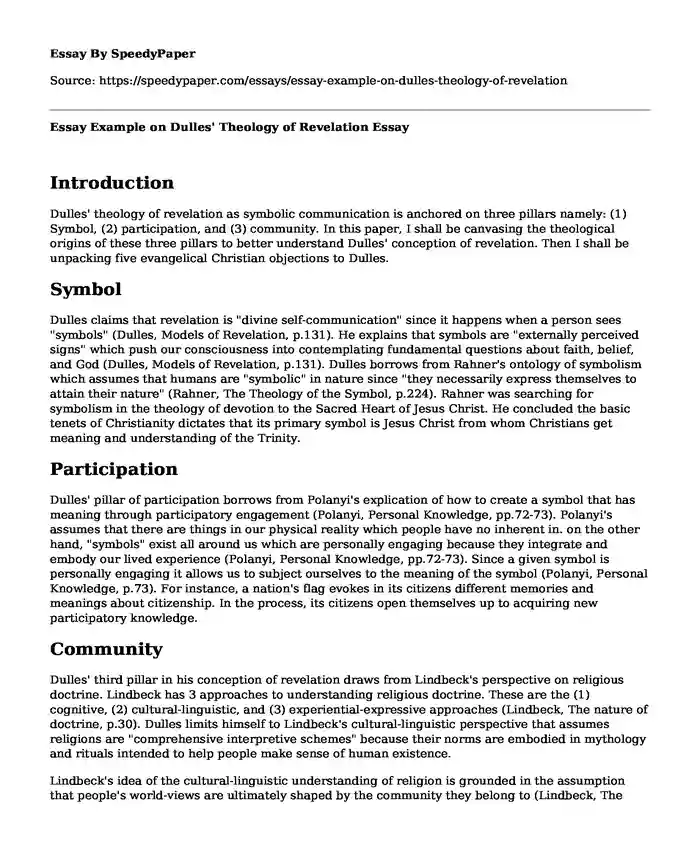
| Type of paper: | Essay |
| Categories: | Communication Religion |
| Pages: | 4 |
| Wordcount: | 845 words |
Introduction
Dulles' theology of revelation as symbolic communication is anchored on three pillars namely: (1) Symbol, (2) participation, and (3) community. In this paper, I shall be canvasing the theological origins of these three pillars to better understand Dulles' conception of revelation. Then I shall be unpacking five evangelical Christian objections to Dulles.
Symbol
Dulles claims that revelation is "divine self-communication" since it happens when a person sees "symbols" (Dulles, Models of Revelation, p.131). He explains that symbols are "externally perceived signs" which push our consciousness into contemplating fundamental questions about faith, belief, and God (Dulles, Models of Revelation, p.131). Dulles borrows from Rahner's ontology of symbolism which assumes that humans are "symbolic" in nature since "they necessarily express themselves to attain their nature" (Rahner, The Theology of the Symbol, p.224). Rahner was searching for symbolism in the theology of devotion to the Sacred Heart of Jesus Christ. He concluded the basic tenets of Christianity dictates that its primary symbol is Jesus Christ from whom Christians get meaning and understanding of the Trinity.
Participation
Dulles' pillar of participation borrows from Polanyi's explication of how to create a symbol that has meaning through participatory engagement (Polanyi, Personal Knowledge, pp.72-73). Polanyi's assumes that there are things in our physical reality which people have no inherent in. on the other hand, "symbols" exist all around us which are personally engaging because they integrate and embody our lived experience (Polanyi, Personal Knowledge, pp.72-73). Since a given symbol is personally engaging it allows us to subject ourselves to the meaning of the symbol (Polanyi, Personal Knowledge, p.73). For instance, a nation's flag evokes in its citizens different memories and meanings about citizenship. In the process, its citizens open themselves up to acquiring new participatory knowledge.
Community
Dulles' third pillar in his conception of revelation draws from Lindbeck's perspective on religious doctrine. Lindbeck has 3 approaches to understanding religious doctrine. These are the (1) cognitive, (2) cultural-linguistic, and (3) experiential-expressive approaches (Lindbeck, The nature of doctrine, p.30). Dulles limits himself to Lindbeck's cultural-linguistic perspective that assumes religions are "comprehensive interpretive schemes" because their norms are embodied in mythology and rituals intended to help people make sense of human existence.
Lindbeck's idea of the cultural-linguistic understanding of religion is grounded in the assumption that people's world-views are ultimately shaped by the community they belong to (Lindbeck, The nature of doctrine, p.32). Dulles embraces Lindbeck's cultural-linguistic approach to propose that the ecclesial community has a primary responsibility to create an engaging environment that makes a member familiar with religious norms and its world-view (Dulles, Models of Revelation, pp.54-63). As he put it: "The locus for understanding the self-communication of God, and its symbolic mediation, is the experience of the community of faith" (Shecterle, Theology of Revelation of Avery Dulles, p. 18).
Elsewhere he puts this point across by saying:"The deeper insights of revelatory knowledge are imparted, not in the first instance through propositional discourse, but through participation in the life and worship of the Church" (Dulles, Craft of Theology, p.18). The import from these two quotations is that in the context of Christianity, revelation happens after a person immerses themselves in the language and culture of the ecclesiastical (faith) community so that they structure their lives around a particular religious tradition.
Critical Appraisal
To Dulles, revelation flows from clear propositional statements attributed to God in the Bible. As he put it elsewhere: ".....revelation is given in the form of ideas that can be adequately expressed in propositional speech-that is to say, in conceptual language that is amenable to syllogistic logic. For centuries it has been common to say that divine revelation consists of truths outlined in the Bible and authoritative Church pronouncements. The Council of Trent in the sixteenth century and the First Vatican Council in the nineteenth seem to have assumed that such was the case, although their words left room for a broader understanding of revelation"(Dulles, Symbolic Structure of Revelation,p.52).
But this would mean parts of the Bible that lack clear propositional statements by God are irrelevant to the faith community experiencing a revelation. The problem is that most of the Bible do not have these clear propositional statements. Hence Dulles wrongly disregards how biblical history plays a role in God's divine revelation. By making revelation a doctrine, Dulles negates how specific events in the Bible are pregnant with theological and doctrinal meanings. (E.g. Cain killing Abel, Jesus' death and resurrection .e.t.c.). By suggesting revelation can only be derived from Biblical texts Dulles ignores the way Christian experience revelations through the Holy Spirit which helps them understand Scripture.
Works cited
Dulles, Avery. "Faith and Revelation." Systematic Theology: Roman Catholic Perspectives 1 (1991): 91-128.
Dulles, Avery. "The symbolic structure of Revelation." Theological Studies 41.1 (1980): 51-73.
Dulles, Avery. The craft of theology: From symbol to the system. The Crossroad Publishing Company, 1995.
Lindbeck, George A. The nature of doctrine: Religion and theology in a postliberal age. Westminster John Knox Press, 1984.
Rahner, Karl. "The theology of the symbol." Theological investigations 4 (1966): 221-252.
Shecterle, Ross A. The Theology of Revelation of Avery Dulles, 1980-1994: Symbolic Mediation. E. Mellen Press, 1996.
Cite this page
Essay Example on Dulles' Theology of Revelation. (2023, Mar 07). Retrieved from https://speedypaper.net/essays/essay-example-on-dulles-theology-of-revelation
Request Removal
If you are the original author of this essay and no longer wish to have it published on the SpeedyPaper website, please click below to request its removal:
- Memento Character Analysis and Comparison, Free Essay on the Movie
- Essay Example on the Value Statistical Life
- Primary Teacher's Perceptions of the Use of Assistive Technology
- Free Essay: Does Sleep Deprivation Affect Memory?
- Free Essay Example on Uses of Psychology in Schools
- Essay Sample on Data Warehousing
- Examining Drug and Substance Abuse as a Social Problem: Essay Sample
Popular categories




